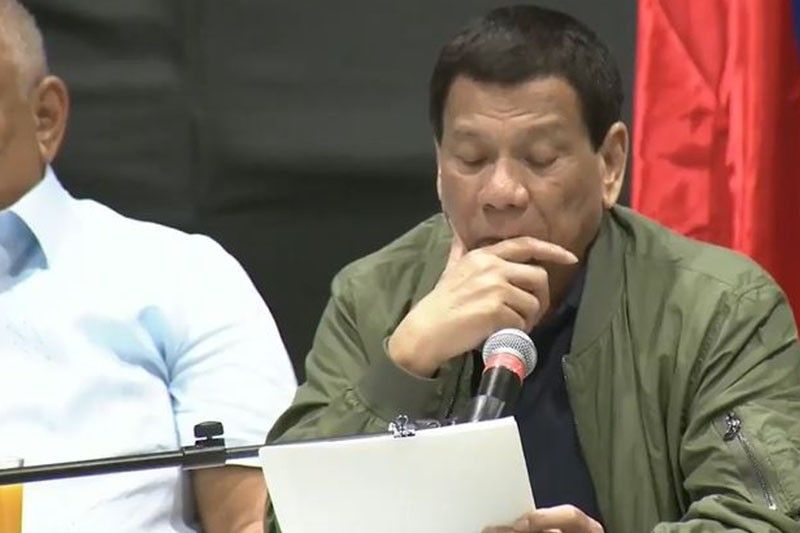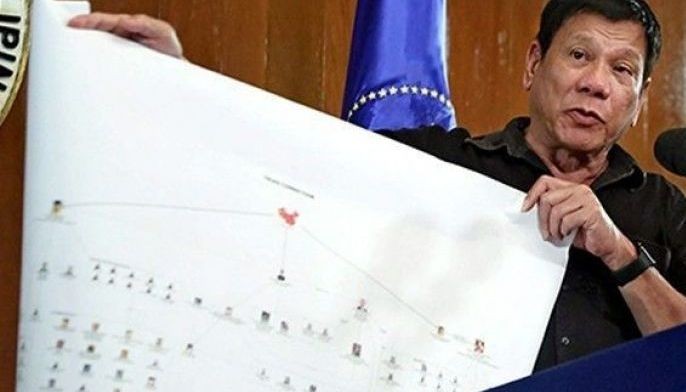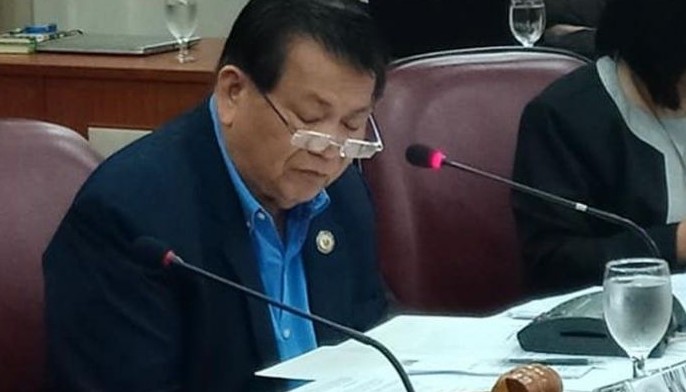Mayors hit ‘politically-motivated’ inclusion in 'narco list'

MANILA, Philippines (Updated 2, 4:36 p.m.) — Local executives said their inclusion on the government’s list of politicians with alleged links to illegal drug trade was “politically motivated.”
President Rodrigo Duterte on Thursday night bared the names of 46 politicians—35 mayors, seven vice mayors, one provincial board member and three members of the House of Representatives—included on the so-called “narco list.” The controversial drug list was released two months ahead of the May midterm polls.
The Department of Interior and Local Government said it has filed complaints before the Office of the Ombudsman against the said incumbent government officials.
Roderick Alcala, mayor of Lucena City in Quezon, tagged House Minority Leader Danilo Suarez as the person responsible for his inclusion on the latest narco-list.
“Mismong si Rep. Danny Suarez tumawag sa akin, sinabihan ako na may hawak siyang dokumento. Pag di ko pinatigil isang broadcaster, ilalabas niya ito. Alam ko on my part na sila ang behind dito,” Alacala told ABS CBN News Channel in an interview.
(Rep. Danny Suarez called me and told me he has documents. If I don’t stop the broadcaster, he would release it. I know on my part that they are behind my inclusion.)
While denying his involvement in the illegal drug trade, Alcala said he is ready to face charges to clear his name.
Suarez has said he had nothing to do with the list.
Mayor Caesar Perez of Los Baños in Laguna also denied drug involvement and said the move was “politically motivated.” He said rumors of his involvement in illegal drugs have been circulating since 2017.
“Masyadong unfair on my part kasi ang tinignan lang nila kung ano ‘yung nakararating sa kanila. Dapat siguro merong due process,” Perez also told ABS CBN News Channel.
(It is really unfair on my part because they only saw what was given to them. There should have been due process.)
Ferdinand Aguinaldo, mayor of Pasuquin in Ilocos Norte, also said that politics is behind his inclusion in the "narco list."
Aguinaldo said authorities should validate its list again, claiming 90 percent of his constituents know the truth about the allegations against him.
The Ilocos Norte mayor is in Manila to celebrate his wedding anniversary but said he will face his constituents and explain his inclusion in the list. He said his camp is still studying what their next steps will be.
"Papalapit na po ang eleksyon at talaga naman pong panahon ng eleksyon, napakarami pong paninira, maraming isyu na sinasabi," Mayor Jefferson Khonghun of Subic in Zambales, who is running for vice governor of Zambales, said in a Facebook post on Wednesday before the list was read out.
(Elections are coming and when it's election season, there are a lot of allegations, there are a lot of issues raised.)
He said he would not be surprised if his name would be on the list since a political rival had already hinted that he was on it. He insinuated it was a political rival that put him on the list.
He added his family has means and does not need engage in the drug trade.
Khonghun was in the list of names that Duterte read out on Thursday.
Cipriano Violago Jr., mayor of San Rafael in Bulacan, claimed a political opponent was responsible for his inclusion on the “narco-list.”
Violago said he could not blame the president who was fed with wrong information.
“Mula noong August 2016, lahat ng imbestigasyon ay aking hinarap upang patunayan na walang katotohanan ang kanilang ibinibintang sa akin. Ako ay ‘cleared’ sa municipal level, provincial level, hanggang sa Camp Crame at iba pang mga ahensya. Subject for delisting na ang aking pangalan ngunit may humaharang nito sa mas mataas pang tanggappan: ang Office of the President,” Violago said.
(Since August 2016, I have been facing investigations to prove that allegations against me are not true. I was cleared in the municipal level, provincial level, even in Camp Crame and other agencies. My name was subject for delisting but someone is preventing it in the Office of the President.)
According to a report on GMA News' "News To Go", the following local officials have also issued denials of their alleged involvement in illegal drugs:
- Mayor Larry Alilio (Lemery, Batangas)
- Mayor Erlon Agustin (Camiling, Tarlac)
- Mayor Jamar Abdullah Mansul (Madji Mutahmad, Basilan)
- Vice Mayor Ottoh Montawal (Datu Montawal, Maguindanao)
Rep. Vicente Veloso (Leyte), who also denied involvement in the drug trade, said he would call for a congressional inquiry into how the government’s “narco list” was made before filing criminal charges against those responsible for putting him on the list.
“It’s important that a lot of people be spared from the rigors I am going through,” Veloso said.
Local Government Secretary Eduardo Año said the list had been evaluated and validated by the Intergency Committee on Anti-Illegal Drugs. The committee is chaired by the Philippine Drug Enforcement Agency and includes the Philippine National Police, the Armed Forces of the Philippines, the National Intelligence Coordinating Agency and other offices.
RELATED: Journalists urged to exercise prudence, fastidious judgment in evaluating ‘narco-list’
Take their case to court
Malacañang on Friday said the individuals included on the government’s list of politicians with alleged links to illegal drug trade could always question their inclusion before a court.
“As I have previously stated, there is always a remedy to judicial resort for those in the list who feel they have been injured by the announcement that their names are included in the list,” Salvador Panelo, presidential spokesperson and chief presidential legal counsel, said.
Earlier, Panelo said that politicians on the government’s drug watchlist could always sue for libel if it could be proven that they have been falsely accused.
Malacañang said the release of the “narco list” is to guide voters in the midterm elections so they would not vote for those with alleged links to the illegal drug trade.
‘A veritable hit list’
Human Rights Watch said the list deprives those named of due process and the presumption of innocence—rights guaranteed under the Constitution.
“President Duterte’s naming of politicians he accuses of involvement in illegal drugs is an outrageous attempt to influence local elections in May. More critically, it’s a veritable hit list in his ‘drug war,’ as past politicians accused of drug involvement all too often end up being shot dead by the police,” Carlos Conde, Philippine researcher for HRW, said.
In 2016, for example, former Albuera, Leyte, Mayor Rolando Espinosa was killed while in government custody for allegedly resisting a search of his cell at a Leyte jail.
Daanbantayan Mayor Vicente Loot, who was called a "narco general" in 2016 was ambushed in 2018 but survived the shooting.
“If the government really has evidence against them, they should be arrested, charged and tried, not be the target of administrative cases by an agency—the interior department—that is under the office of the president,” Conde said.
He added: “This weaponizing of the ‘drug war’ against politicians further undermines the rule of law, democracy and civil liberties in the Philippines.” — Gaea Katreena Cabico
- Latest
- Trending

































